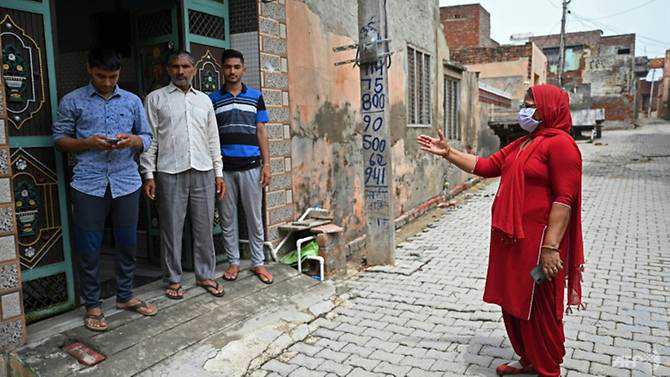In rural India, concern with testing and vaccines hampers COVID-19 fight
05 June, 2021

When health employee Neelam Kumari knocks in doorways in Indian villages the occupants quite often run out the trunk, terrified that she really wants to vaccinate them against COVID-19.
With India's devastating new virus surge easing in cities, the deadly pandemic is ravaging the vast poverty-stricken rural hinterland. But here, ignorance and dread rule.
"A lot of men and women in my own village don't desire to take on the vaccine. They dread that they can die if they consider it," Kumari advised AFP in Dhatrath, a assortment of two-storey structures in Haryana talk about with buffaloes wandering the streets.
Many found in rural areas are actually hesitant about getting vaccinated due to ignorance and rumours about side effects, health personnel say AFP/Money SHARMA
"Among the villagers was so angry that he take down a (health) employee who was striving to convince him to take on the vaccine."
Just 15 % of men and women in rural areas, compared with 30 % in towns and cities, have received at least 1 vaccine dose up to now - despite the fact that two-thirds of instances are being reported in the countryside, according to an analysis simply by The Hindu daily.
Rumours are actually shared online or pass on through messaging software like WhatsApp. Fears that 5G causes COVID-19 resulted in mobile towers becoming attacked in Haryana.
"People usually do not even step of progress for testing because they think the federal government will declare them Covid-positive regardless if they aren't," Shoeb Ali, a health care provider in Miyaganj village found in the northern talk about of Uttar Pradesh, told AFP.
"DEATHS AFTER SHOTS"
This fear pervades despite the sight of bodies dumped in rivers and hundreds of shallow graves suggesting that COVID-19 is raging in India's hinterland where 70 % of the 1.3-billion population lives.
In Nuran Khera village in Haryana, residents are reluctant to get inoculated despite the fact that they said various households reported having fever - and dozens of folks dying.
"Even after checking a vaccine centre in this article, nobody is ready to take it," villager Rajesh Kumar, 45, told AFP.
"I won't have the vaccine since it has many side effects. People get sick after getting vaccines."
In other states, studies have emerged of individuals jumping into rivers or fleeing into forests merely to escape cellular health teams.
Hom Kumari, a wellness worker at Bhatau Jamalpur village in Uttar Pradesh, said some locals seemed out of the question to convince.
"What do we tell someone who says, 'If I'm destined to live, I will, even without the vaccine'?," she asked.
Health facilities are actually also few in number and some people assume that going to a public medical center is more dangerous than staying away.
"People who visited hospital never returned," another villager in Nuran Khera, who gave his 1st brand as Kuldip, told AFP.
Kumar said that when his wife fell sick, an exclusive clinic wanted 50,000 rupees (US$700) beforehand to handle her. A health care provider at a public hospital thought to take her home.
"My neighbours started saying she's corona. These were frightened," he added. "I took care of her and on the third day she was back again on her behalf feet."
COMMUNICATION KEY
Coronavirus in addition has dealt the Indian market much blow, and villagers tend to be more concerned about making ends encounter, said community health consultant Rajib Dasgupta.
"It's extremely challenging to connect why vaccination is essential until some of those distressed conditions happen to be alleviated," Dasgupta told AFP.
Experts say that India must apply the lessons learnt found in its polio vaccination plan found in the 2000s of kids under five.
The programme succeeded after trusted community leaders were involved to spread the message to parents that inoculation was safe.
Using a similar approach, spiritual leaders in Uttar Pradesh had been recently called directly into motivate their followers to receive vaccinated for coronavirus.
Navneet Singh, who oversees immunisation work found in Haryana's Jind district, says that face-to-face interaction had helped make sure that nearly 70 percent of over-45s found in Kalwa and neighbouring villages have received at least 1 shot.
Kalwa health worker Sheela Devi said her "heart was pounding" when her brand was included in the vaccination list, but she was reassured when she saw the local doctor getting the shot.
Now she works every day in the village, heading door-to-door trying to chat persons round, with some success.
"Gradually they were convinced that even if they get corona after getting vaccinated, they don't need hospitalisation. They are able to take drugs and recover in the home," the 45-year-good old told AFP.
Source:
